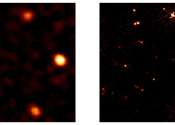Distant Milky Way-like galaxies reveal star formation history of the universe
Look at this new radio image covered with dots, each of which is a distant galaxy! The brightest spots are galaxies that are powered by supermassive black holes and shine bright in radio light. But what makes this image special ...









